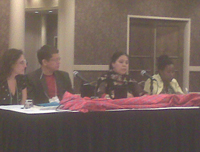To be effective partners with Christians around the world, Presbyterians must be willing to be physically present, three global leaders told a gathering of more than 100 mission advocates here over the weekend.
"Out of all the gifts the Presbyterian Church (U.S.A.) offers the most important is your presence in our part of the world," Veeda Javaid of the Pakistan Education Board told the "Mission Crossroads" conference as part of a panel discussion of Presbyterian World Mission's strategic goals.
She was joined on the panel by Veronica Muchiri of the Presbyterian Church of East Africa and the Rev. Milton Mejia of the Presbyterian Church of Colombia. The gathering included mission advocates from many PC(USA) presbyteries, leaders of several mission networks and PC(USA) World Mission staff.
As churches and ecumenical agencies are forced to cut back, the relationships that are the lifeblood of partnership are threatened, Mejia said. "The [global economic crisis] has affected everyone in the world and is the reason why churches must reevaluate mission," he said. "But to be faithful to God, we cannot respond with an economic mentality that money is paramount."
The tendency to reduce mission in tough economic times too often means "that relationships are reduced," he said. "There are no recipes."
Mejia praised a recent ecumenical visit to Colombia by representatives of the Latin American Council of Churches, the National Council of Churches in the U.S. and Church World Service. "Because of limited resources, the visitors stayed in people's homes and it had a great impact," he said. "We now an expectation that we can continue to work for peace and reconciliation."
Maintaining those relationships is especially important in Colombia now, Mejia continued, "because the conflict in our country is losing interest internationally. It is difficult to share about peace and reconciliation in my country because what is triumphing is the logic that peace can be achieved militarily."
In Kenya, where a new constitution is being implemented, communication, education and empowerment — especially of women — are paramount concerns for the churches, Muchiri said. "We don't want to be left behind. We want to be involved because the new constitution opens up many opportunities, especially for women," she said.
"We need to speak out and educate our people — to be a voice for the voiceless — so they can know what is happening," Muchiri said. "The church needs to be an information disseminator and a people connector, all the way down to the village level."
The role of global partners, such as the PC(USA), she added, "is to listen to our people who are on the ground and then walk with them. Physical presence — listening, building relationships — is so important to us all. I want to think as a Kenyan, not as an American, but I appreciate Americans because we are all created in the image of God."
Javaid praised Presbyterian World Mission’s new strategic plan "so the whole church can collaborate with partners overseas. Respecting partners also makes for good collaboration."
Mejia agreed. "When we are willing to risk ourselves, to share the small things coming out of our faith," he said, "it is in this dialogue and personal sharing that we learn each others' spirituality and build collaborative, long-term relationships."

